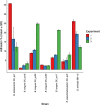In vitro adhesion, pilus expression, and in vivo amelioration of antibiotic-induced microbiota disturbance by Bifidobacterium spp. strains from fecal donors
- PMID: 37401755
- PMCID: PMC10321227
- DOI: 10.1080/19490976.2023.2229944
In vitro adhesion, pilus expression, and in vivo amelioration of antibiotic-induced microbiota disturbance by Bifidobacterium spp. strains from fecal donors
Abstract
Fecal microbiota transplantation (FMT) is used routinely to treat recurrent Clostridioides difficile infection (rCDI) and investigated as a treatment for numerous conditions associated with gut microbiota alterations. Metagenomic analyses have indicated that recipient colonization by donor bacteria may be associated with favorable clinical outcomes. Bifidobacteria are abundant gut commensals associated with health. We have previously demonstrated that Bifidobacterium strains transferred in FMT can colonize recipients in long term, at least for a year, and recovered such strains by cultivation. This study addressed in vitro adhesion and pilus gene expression of long-term colonizing Bifidobacterium strains from FMT donors as well as in vivo colonization and capability to ameliorate antibiotic-induced microbiota disturbance. RNA-Seq differential gene expression analysis showed that the strongly adherent B. longum strains DY_pv11 and DX_pv23 expressed tight adherence and sortase-dependent pilus genes, respectively. Two B. longum strains, adherent DX_pv23 and poorly adhering DX_pv18, were selected to address in vivo colonization and efficacy to restore antibiotic-disturbed microbiota in C57BL/6 murine model. DX_pv23 colonized mice transiently with a rate comparable to that of the B. animalis BB-12 used as a reference. Although long-term colonization was not observed with any of the three strains, 16S rRNA gene profiling revealed that oral administration of DX_pv23 enhanced the recovery of antibiotic-disturbed microbiota to the original configuration significantly better than the other strains. The findings suggest that selected strains from FMT donors, such as DX_pv23 in this study, may have therapeutic potential by in vitro expression of colonization factors and boosting endogenous gut microbiota.
Keywords: Bacteriotherapy; dysbiosis; fecal microbiota transplantation; gut microbiota; next-generation probiotics.
Conflict of interest statement
No potential conflict of interest was reported by the author(s).
Figures






References
-
- Ianiro G, Punčochář M, Karcher N, Porcari S, Armanini F, Asnicar F, Beghini F, Blanco-Míguez A, Cumbo F, Manghi P, et al. Variability of strain engraftment and predictability of microbiome composition after fecal microbiota transplantation across different diseases. Nat Med. 2022;28(9):1913–1923. doi:10.1038/s41591-022-01964-3. - DOI - PMC - PubMed
Publication types
MeSH terms
Substances
LinkOut - more resources
Full Text Sources
Miscellaneous
